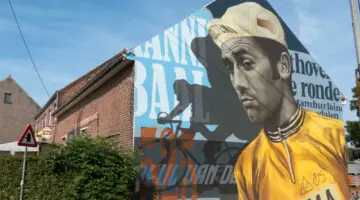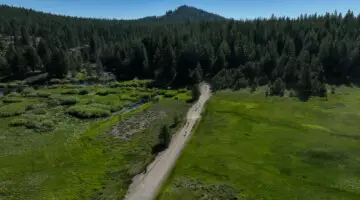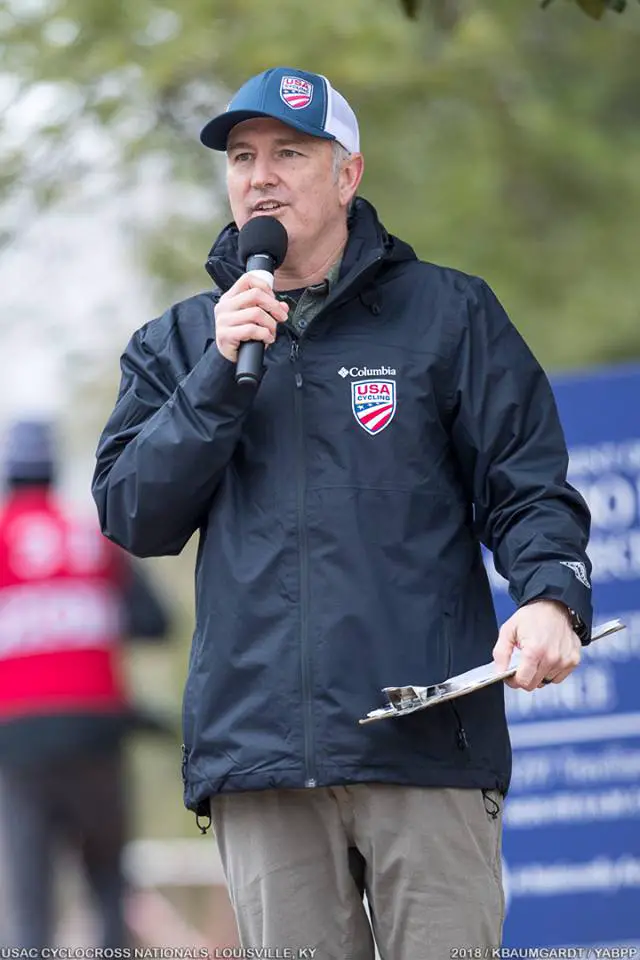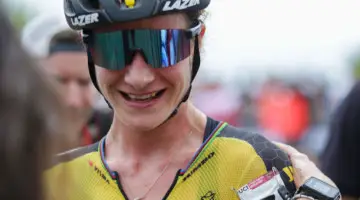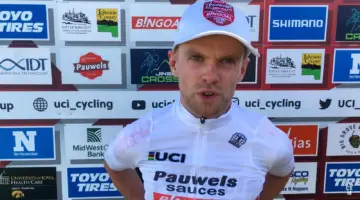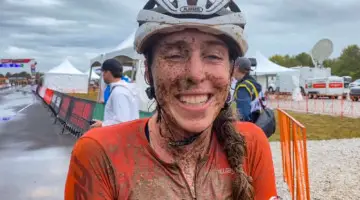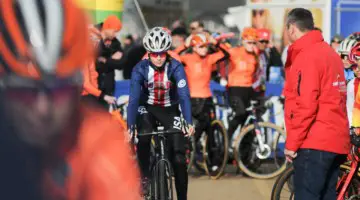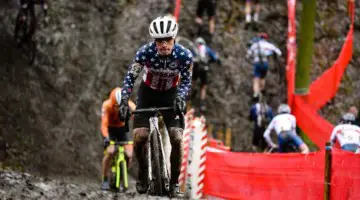We spend a lot of time (rightfully) focusing on the athletes in the sport of cyclocross, but this year, we wanted to peek behind the curtain and spotlight some of the folks who help make the cyclocross world turn—the race directors, announcers, photographers, members of the media and more.
First up in our informal series The Dismount (thanks to Twitter user Nerdy Dad Online for the name) is the Unofficial Voice of Cyclocross Scot Herrmann of Ohio. OVCX racers likely know Herrmann’s voice well, and those who race on the national scene have likely heard him at CrossVegas, World Cup Waterloo and U.S. Cyclocross Nationals, among other big races.
Herrmann’s journey to announcing some of the sport’s top races did not come without a high level of professionalism and a willingness to bring excitement and happiness to events starting with the smallest local cyclocross race. When Brook Watts asked him to announce the first-ever U.S. World Cup at CrossVegas in 2015, it was an honor over a decade in the making for him.
Herrmann did his first bike race at age 8 and quickly fell in love with the sport. When his team looked at him to announce the team crit in 2003, he fell in love with sharing the love on the mic.
“I am never short on words, and I do like to talk,” Herrmann said with a laugh.
“I like interacting with people and making people happy. I call that a blessing and a curse, particularly in this business. But it brings me joy to have other people respond and be happy about things. As a race announcer, that’s your primary job, I think. Create that ambiance or create that environment where people are enjoying themselves.”
For Herrmann, announcing a bike race is not only about showing up and talking for upwards of 10 hours—although he does bring the same energy for a 9 a.m. Cat 5 race as he does a World Cup. Before he arrives at the venue, he has done plenty of homework.
When it comes to cyclocross, Herrmann and his wife Julie, an announcing partner and race director for Cincinnati Cyclocross, can be found on weekend “off-days” watching European cyclocross races and brushing up on locals to give shout-outs to.
“We are both so far into it, when we think about taking trips places, we base them around watching cyclocross,” he said. “We’re thinking about it again for this season. We’re watching it, we’re trying to understand it.”
Looking at the announcer’s booth from the outside, one might think race announcer is a position for people who enjoy being the center of attention. For the humble Midwesterner, that is anything but the case.
“It never enters my brain that it’s about me, it’s about the participants. And maybe more importantly, it’s about the spectators,” Herrmann said. “What I’m trying to do is grow the sport of cycling and get people to come back and watch bike racing again.”
I recently took the time to chat with Herrmann about his craft as a bike race announcer. I do some race announcing myself here in Wisconsin, so as you might imagine when you put two announcers together, it was ummm, a long conversation.
You can read an “abridged” transcript of our conversation below. Stay tuned for more features on the folks working behind the cyclocross scenes.
Interview: Race Announcer Scot Herrmann
Cyclocross Magazine: How did you get your start as a bike race announcer?
Scot Herrmann: I was racing for a team Team Dayton Cycling in 2003. We used to put on a bike race every year, and I want to say it was 2002, they had a crit they put on and something happened with the race announcer, and I”m not kidding, I’ve told this joke before, they looked at me in a board meeting and said, “Hey Herrmann, you talk a lot, why don’t you do it?” That’s literally how I got my start. I was announcing my local team criterium.
CXM: You must have enjoyed it then?
SH: I am never short on words, and I do like to talk. I like interacting with people and making people happy. I call that a blessing and a curse, particularly in this business. But it brings me joy to have other people respond and be happy about things. As a race announcer, that’s your primary job, I think. Create that ambiance or create that environment where people are enjoying themselves.
If they’re not enjoying themselves, then why do it, but number two, from an event standpoint, why would you ever want to come back if you didn’t have a good time? Having the opportunity to do that, I found something that I really enjoy.
CXM: This is kicking off kind of a behind-the-scenes series, so what’s a day like as an announcer? What are some of the challenges? What are some of the things an announcer might have to do that you might not think of?
SH: Have you ever been into the green room with the couch and heater that they provide you at races?
CXM: Um, no. You’re joking right.
SH: Haha, I haven’t either. Let’s walk through the day of a typical bike race announcer. It doesn’t matter if it’s a criterium or a World Cup or a local race. So you’ve done all the research ahead of time. Let’s talk about day-of.
I like to be at a venue an hour and a half before the first race. Then there’s some homework you had to have done ahead of time. My number one question is, “What kind of PA system do you have and does it have a wireless microphone?” Those are the things I need to know before I get there because I have to tell you that has a small PA system and a wired microphone, it will take away from the experience.
The announcer is not the most important part of the event, I get that, but it’s an important part if you’re looking to create a good environment. This isn’t shared by everyone, but for me, the wireless microphone allows me to reach the masses both physically by being able to walk around and do those interviews as well as from a sound quality standpoint.
And honestly, part of it is protection for yourself. If I show up and it’s a really small PA system, I am going to have to raise my voice and yell louder for people to hear me. Otherwise they come to me and say, “We can’t hear you.” It’s like, ‘There’s nothing I can do about that.” So I want to know those things. We’ll say that’s still the day before.
You arrive to the site an hour, hour and half ahead of time, you have your notebooks, you find your spot and settle in. The race director is the first person you check in with because they want to know the announcer is there and ready to go. Then about an hour ahead of time I like to do some light announcements to get the blood flowing. I’ve worked with Dave Towle a lot, and he’s taught me a lot of these pre-race things.
Then about a half-hour before, you just start talking. You talk a little bit about how the morning is going, what the weather is like, things we are going to see today, things we hope to see today, what we saw last year. It’s less about what people are doing and more about warming your voice up at that point. You have to warm those things up. It doesn’t matter if it’s hot or cold outside. That light talking will sort of get you up to speed.
About 15 minutes before the races start, you check in with the race director one more time to get any last tidbits about the race, updates on sponsors, information about the course, things like that. Then you check in with the officials. For cyclocross, you have to find out things like are we using an early bell? That’s an important one. Do you know about that one?
CXM: Maybe?
SH: The early bell is they will start ringing the bell early for people who are in danger of getting caught in the last lap. If you’re not paying attention, and I’ve been caught, talking about making mistakes, they start ringing the bell about a minute after the leaders come through, and all of a sudden I think everyone is finishing on the next lap. You start calling people done when they still have a lap to go and that’s not good.
CXM: That’s not good! I’ve had people accuse me of telling them they’re done early, but that was just them not listening.
SH: Nope. Did it in Cincinnati, did it to a hometown kid. Early bell was out, and there was commotion going on around the stage. There were people arguing about something on stage. After a few minutes I turned my attention back to the race, my first mistake was turning my attention away, and I called them finishing because I had been listening to that bell ring for 5 minutes. They had not gotten the bell yet, and said, “You’re done.” I rightfully got yelled at by the parents and the officials. It was nobody’s fault but my own. You do not want to make a mistake like that as an announcer. As I said at the beginning, I am not infallible. You need to meet with the officials and find those things out.
Also, where’s staging? How soon should I call riders to staging? Are we doing podiums immediately following or after the protest period? Am I going to call them? Where are my start lists? All of those things you need to get morning-of before the first race.
Then you said something funny like, “When do you take breaks?” Well, you go to the bathroom when you can. Not at the start of a race and not at a finish. It usually helps when there’s two people there. If you want to know how an announcer’s day is going, look at their feet and see how much garbage is piling up there. If it’s a crazy day, you’ll see food wrappers, start sheets, podium sheets all crumpled up on the floor because you don’t have time to throw them away because you’re just taking things as they come.
It’s a busy day. Very often it starts at 6:30 or 7 in the morning and you call the final podium at 5 or 6 in the evening. That’s the day, managing chaos. What I will say, something Julie and I do, maybe other announcers do, again from her perspective as a race director, part of your job is to make the race director’s day easier. They should not have to worry about what the announcer has said or is doing, but on top of that, we know the things that can make a director’s day easier.
If the race director is like, “I have a box of primes over here, I have a box of stuff to give away, but I don’t have someone to manage it,” very often you say, “Give me the podium sheet, give me the prizes, whatever they are, and I got this.” That can make your day a little more hectic, but if that’s something you can do to make their day easier and make the experience for the racers and spectators better, then you have to do those things. You have to be ready to do it all.
Then the last thing I’ll say is sometimes when you finish the day, we had a joke with Shawn Brett when I was working Nationals in Hagerstown, he said, “Can you guys help me roll up this trim?” Trim is the long banners that go along the finish line. So we rolled it up and folded it and helped pick it up. He stopped and shook our hands and said, “I really appreciate it. I was actually kidding when I asked you if you could help us pack this stuff up.”
It made his day, and he was very appreciative of it. It was outside what we were hired to do, but if there’s something you can do to help with the circus, then do it. Again, it’s not about you, it’s about the greater good.
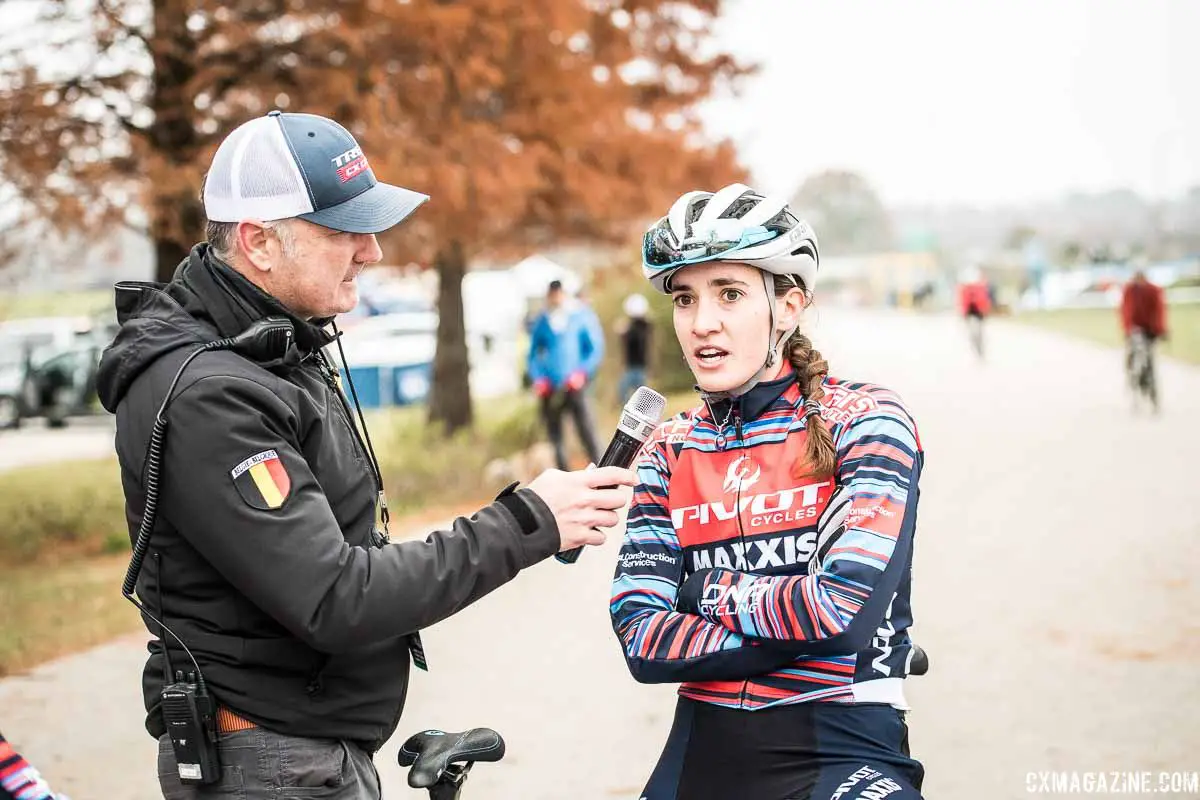
Scot Herrmann interviews Sofia Gomez Villafane at the 2018 Major Taylor Cross Cup Day 2. © Mike Almert, Action Images Indy
CXM: I do some race announcing here and there, so I can identify with you a bit. When I approach it, I have a kind of a goal I want to achieve when I announce a race. Have you put thought into that and your craft and what you want to be as an announcer?
SH: Yes. If we’re talking about an event and what’s number one, number two, number three, I’ve learned a lot from people who have done a lot to promote bike races. I always ask them, “What’s your goal? What do you want to get out of the race?”
I’ll go back to Brook Watts talking to me about what he wanted out of CrossVegas when he hired me to announce that race. He said, “Your job is to number one, call the race.” That’s the number one job, right? That’s what you’re there to do. It’s not necessarily to wax poetically about the environment or go on about other things. Call the race because people who are there to spectate want to know what’s going on. As the announcer, you have to know what’s going on at all times. If you’re distracted or you’re doing something else, you will not be able to call the action.
Then he said, “Your number two job is to sell beer.”
CXM: Fair.
SH: Number one is to call the race for me, but then involving the spectators and involving the participants is important as well. Gathering the people in and talking about what they’re seeing and what’s going on in the race.
I have to tell you, the number one complement I can receive at a race is when someone comes up to me and says, “You know what, I’ve been to a hundred bike races with my family, and I’ve never understood the technology and what’s going on. They go out on their bike, and that’s what I know. But today, you brought that all to me, and I really enjoyed it and learned a ton about bike racing.”
How can you not love that feedback? That’s the philosophy going into an event. Involve the spectators, involve the participants and create and environment people want to come back to.
CXM: We chatted about it briefly last November, I, as an announcer, only come back because people seem to not hate me, and you said the same was true for you. How do you deal with feedback and pushing yourself to improve? Because it can be hard the way American sports fans treat announcers.
SH: I exist in the corporate world in my daily job, and I’ve been in that for 20-plus years. In the corporate world they say, “Feedback is a gift.” It’s something given to you sometimes when you don’t even ask for it. And I’m not going to say that I don’t always respond to it perfectly, but in my daily life and my announcer life, I go in with the mentality that I am not perfect. I’m not going to do it perfectly every time. But, you have to take feedback, whether it’s good or bad.
Experience also lets you take that feedback. Feedback can be anything from someone coming up and whispering in your ear, “Hey, I know you said their last name is Smith, but you pronounced it Smythe,” or having someone scream at you from the other side of the course calling you an idiot for saying their name wrong. That’s the spectrum of feedback, and you have to understand, people come from a different spot and you take the feedback and make your notes.
The feedback I don’t like is when I’ve made a mistake more than once. Then it’s on me and not on them and how they deliver it. Just take that, learn from it and move forward.
I think you can stack your odds in a couple ways. I am a student of the sport. When it comes to announcing any event, whether it be a local criterium or a World Cup, I do a lot of research ahead of time to know as many people as I can. Know their names, know their histories. That helps up the event and lessen that feedback loop.
CXM: You stole my question. I know you are always well-prepared and do your homework. How long ago did you develop that technique and approach to being an announcer?
SH: I don’t know how long ago, but I will say that as I’ve started branching out from local to regional and national events, no one really taught me that piece of it. The joke is I’m just trying to get through life without looking like an idiot.
I don’t want to show up at the CrossVegas World Cup and not have a basic ability to say the names. Announcing European names is a whole different story. If you’re not from Belgium, you’re not going to pronounce it correctly, but you can make a big effort to get as close as you possible can.
As I’ve branched out more into National events, then I have to know that background or I’m there to just call the races and I’m not adding anything to the environment. If you don’t know the local legends and the local people and dialect and things like that, then you’re sort of taking away from the event. And that’s something I never want to do. I never want to detract from an event, I only want to add to it.
Part of that strategy is to do a lot of homework ahead of time, but then when I get there, I arrive with a set of questions. I was at Amateur Road Natioanls in Hagerstown and I wrote down a set that included, “How do you say Hagerstown?” Because I walked in the door saying Hahgerstown only to find out that was wrong. I said, “Just say the name once for me.” I’ll knock down my questions before I get on the microphone.
CXM: You’re lucky you didn’t have to announce the race in Denmark.
SH: I know, right. I think my goal for announcing names like that is you don’t have to get it right, but as long as you’ve got a decent mastery and you’re making the attempt, you’re going to be okay. I cannot say Wout van Aert’s name like he does, it’s something he’s grown up with. You cannot call him Woot van Art, because that’s not even close. But at the same time, I’ve gotten feedback that I didn’t say it perfectly. It’s like, I’m saying it as perfectly as an American can. I’ve done my homework, and I’ve given it my best shot.
CXM: What was it like starting as a local announcer and moving on to getting invited to some of the biggest races in America? What has that experience been like for you?
SH: I was thinking about this the other day, but I’m pretty sure my first bike race was at about 8 years old in BMX. I’ve been racing bikes for a very long time. I started with BMX and then I did triathlons for a long time until kids came along, and I suddenly couldn’t train seven days a week, twice a day. Mountain bike racing has been a big passion of mine, some criterium racing.
When you ask me how’s it been, I’ll ask you, what’s a sport you love? What’s a sport you’ve loved since you were young. For you it would probably be basketball, right?
CXM: Oh yeah, for sure.
SH: How would it be if they asked you to go announce an NBA game?
CXM: Holy crap, that would be incredible.
SH: There you go. That’s your answer. That’s how I feel every single time. I’m like, you have got to be kidding me. I love this sport, I’ve loved this sport since I was very young, and now you’re asking me to go talk about the best people at it in the world. It’s a dream come true, or whatever you want to call it.
People occasionally ask me, “Hey, you’re really good, can you announce our 5k running race?” I’m always flattered and I think it would be a good chance to make people happy, but it’s not what my passion is. My passion is cycling. So that’s what it feels like, man. It’s like you going to announce the NBA Finals.
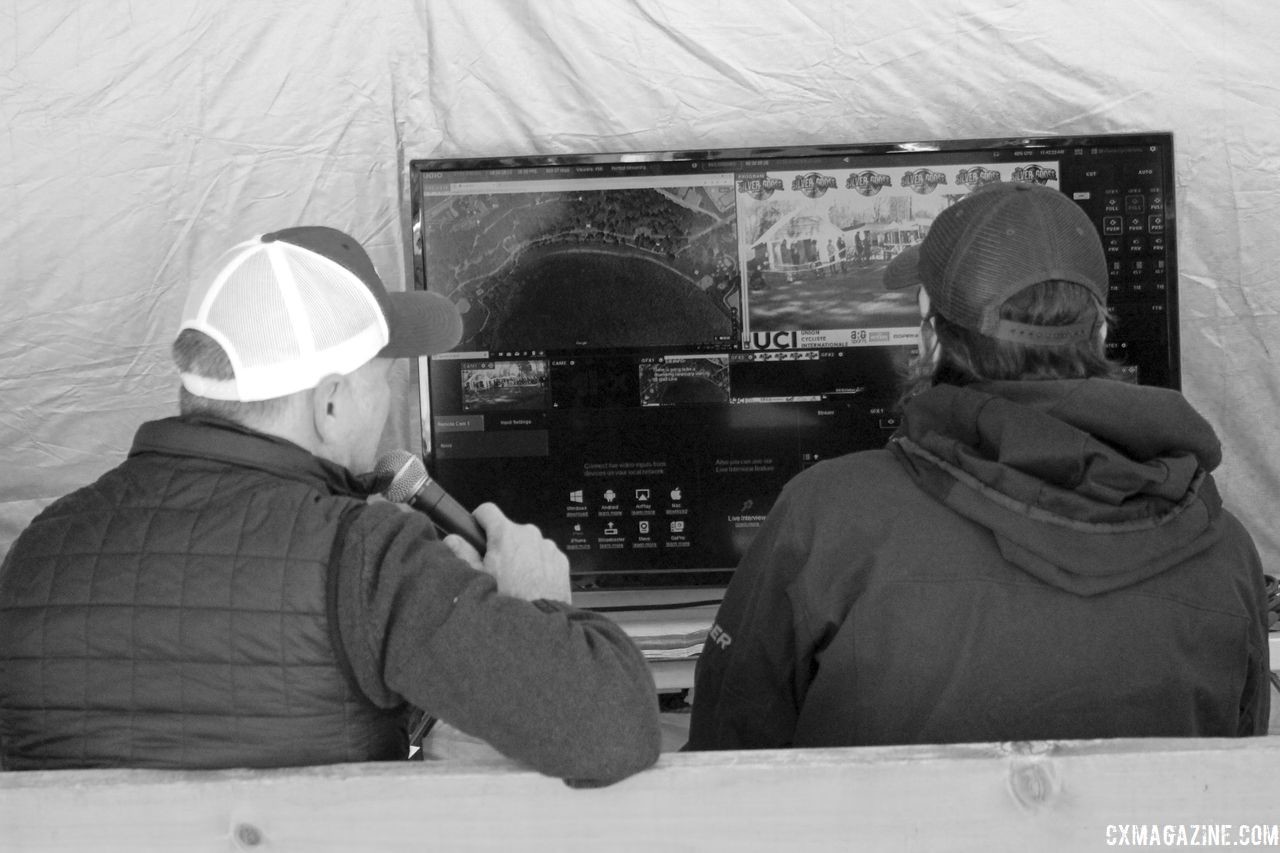
Scott Hermann and Bill Schiecken handled commentating on the live stream on Sunday. 2018 Pan-American Cyclocross Championships, Midland, Ontario. © Z. Schuster / Cyclocross Magazine
CXM: When we chatted in Midland, again, I told you that you first caught my attention in 2017 at World Cup Waterloo and I was like, as a fellow announcer, “This guy doesn’t suck,” which is a pretty good complement from a fellow announcer.
SH: I know exactly what you mean.
CXM: I think there are some people as announcers who try to make it about themselves, but you come across as very humble. Do you think that has been important to your success? Why do you think people have responded well to your craft?
SH: That’s a great question. I haven’t really thought about that. I guess I would answer that in a couple ways. One is I go into races knowing it’s not about me. I’m not saying other people take that approach, but to your point, it’s not about me. I am there to number one, call the race and number two get the spectators and participants involved.
I guess it doesn’t factor into my thought process that I am somehow above this sport or more important than what’s going on out there. I would again go back to my corporate training and my day job, my paying job. Bill Schieken calls his day job his “day job” and all the other things he does his “creative job,” so I would call announcing my creative job. But I think one lends itself to the other.
I’ve spent my time in the corporate world in leadership positions out of a desire to not be over people but help them be the best people they can possibly be and be as successful as possible. That’s what my blessing and my curse is; wanting to see other people succeed and do great things in life. I really derive happiness from that. And that extends into the announcing piece.
It never enters my brain that it’s about me; it’s about the participants. And maybe more importantly, it’s about the spectators. What I’m trying to do is grow the sport of cycling and get people to come back and watch bike racing again. Yes, participants are the key players in that, but the people watching are as important as they are, because if they don’t come back and support cycling, then we don’t have events.
CXM: A couple years ago, I got invited to announce a local crit. I was excited, but I didn’t really know much about crits. I went and did a few and watched a few on TV to do “research” and felt like I was more or less making stuff up. One thing I really like about your announcing is you provide that knowledge about tactics and what’s going on and you get it right. How much are you watching Euro races, trying to learn Dutch and making sure you’re teaching your audience the correct stuff?
SH: My wife Julie is just as into it as I am. On Saturday or Sunday mornings, if we’re not announcing a bike race during cyclocross season, we’re watching the feeds from Belgium and trying to understand what they’re saying. Last year, the two of us took a trip to watch the World Championships in Valkenburg. We wanted to see what that was all about.
One thing we learned was the correct pronunciation of Valkenburg. Do you know what it is?
CXM: No.
SH: It’s Valkenburghhh.
CXM: Never would have gotten that correct.
SH: We learned that when we were there. My point is, we are both so far into it, when we think about taking trips places, we base them around watching cyclocross. We’re thinking about it again for this season. We’re watching it, we’re trying to understand it. To go travel in Belgium, we had to learn as much Dutch as we possibly could.
I’m not going to say I understand it really well, but I will tell you there’s a game in house where every time the announcer on Sporza says “klein beetje,” we use it to play bingo. It sounds like clam-bitch but I think it means “a little bit.” Now that I say it to you, when you watch any of the Belgian races, you’ll probably hear them say clam-bitch at least three or four times during a race. It’s hilarious.
That said, we try and understand those things. When it comes to announcing, I watch a lot of interviews on YouTube that are not in English so I can try and get the, sort of, correct pronunciations of things and people’s names.
CXM: I find it amusing to see which English words they end up using because there aren’t words in Dutch. Like every time Namur rolls around, the announcers will talk about the “mountain bike-sters.”
SH: Rock and roll is another one. They’re say something and all of a sudden you’ll hear “rock and roll.”
CXM: Speaking of Julie, you and her crushed it at Nationals this year.
SH: Thanks!
CXM: How has it been having a partnership as announcers but also being partners as husband and wife?
SH: She’s smarter than I am. She is a very intelligent person who remembers things I simply cannot remember. When it comes to past finishes and where people are in the standings, she can remember it and pull that fact up whenever she wants. You’ll notice I take a lot of notes and do a lot of research, but she does not to need to do very much of that. Early on a Sunday morning, she’ll be up watching a cyclocross race in Europe before I can get out of bed. She’s a bigger fan than I am! It’s easy announcing with a person like that.
She also has the blessing and the curse of not being able to stop from wanting people to be happy. We just announced a local crit together, and we had a blast doing it. Now I would contend, this weekend and the prior weekend we had people sitting in the tent with us who have known us for years, and they got to hear a lot of off-mic comments and they said, “This is its own reality show in itself,” because we were teasing each other and giving it each other a hard time. It’s a good relationship, and we have a lot of fun together.
With our backgrounds, we understand training and discipline and what the end result needs to be. Being very professional about it and programmatic about some things, it’s really easy to work with her. To your point before, she puts the race and the racers first. She’s also a race director of the Cincinnati C1 weekend, so she understands the impact an announcer can have on your event in both a good and bad way. So she has that perspective as well. She knows something you say to a person when you have a microphone in your hand can change the entire atmosphere and dynamic of a bike race. Knowing that, you know how to do the right thing.
CXM: I promised I would ask you the hard-hitting questions in this interview, and that’s a perfect lead-in. Last year, the issue of sexism among male announcers was in the news last year. It’s still primarily a male-dominated sport, and I would contend we still have a lot of work to do to create a welcoming environment for all women.
You know this first-hand, but one inappropriate comment can cost you a career’s worth of work. How do you handle that, in terms of being fair and equitable, knowing the history in the sport?
SH: I could probably talk about this topic for an hour; how I feel about it and what I think about it. I’ll try to talk about it from my perspective and not project onto others.
CXM: Well, I think you do a good job creating a great atmosphere at races.
SH: Thank you. At the same time, I’m not going to say I’m infallible. I make mistakes, and I’m always willing to learn from my mistakes and get better.
But here’s the way I’ve summarized it for other people. If it’s not in you, it’s not coming out of you. Plain and simple. If it’s in you, you have to worry about it coming out of you. I don’t know exactly what it is, and I’m not going to say I’m infallible, but here’s some things that help me be me.
Number one, I was raised by a single mother. A very strong woman, and my mother is everything to me. My dad is around, but he wasn’t around for much my childhood. Much of my perception of the world is through a very caring, very nurturing woman. Through her eyes. I think that helps me a lot. I’m not immune to some of the pitfalls and things like that, but at the same time, I don’t have those deep early-childhood things that I think people can fall into.
I don’t worry about those things when I’m announcing. If you talk about things that may be said on an announcer’s platform, I’m not concerned. I don’t have those things in me, so it’s not going to come out of me. It’s actually worse when people bring it up because then I start thinking about not saying them. I wouldn’t have thought about saying those things until someone brought them up. So I’ve literally been concerned about it.
Number two, it comes back to it not being about me. I’m not injecting my feelings into the race. And being as close as I have been to putting on bike races, I know what a bad feeling is, and the last thing I want is for someone’s race to be ruined because the announcer says something wrong. I’m not that guy.
Thirdly, I’ve lived in the corporate world for 20-plus years now. I know right from wrong, I lead people and help them understand right from wrong, and I’m pretty perceptive on what “wrong” means. My values system just doesn’t allow for things to be said that are sexist or offensive like that. I don’t think that way, but it doesn’t concern me.
CXM: I thought the it’s not in you, not coming out part was really interesting. The issue is certainly something I am cognizant of, so I wanted to hear your perspective. When I think about it, I’ve tried to treat every person out there as an athlete. Whether you’re a man or woman riding your bike, you’re a bike racer.
I also feel like being able to announce a race is somewhat of a privileged position, and as white dudes in the sport, we kind of have an obligation to be agents for equality and inclusion. I don’t know if you have thoughts about that?
SH: I’m not totally sure how to react to that. As you put it, I think I look at people first as athletes, and particularly as bike racers. Here’s what I’m worried about. I understand my position and the privilege I have, and I never want to try and diminish someone else. At the same time, I don’t want to be seen as someone who’s not trying to lift up someone because of their gender or race or whatever. I am trying to make us all feel better about the sport I love so much.
I try not to put people in tranches based on sex, race or another characterists; I view them all as bike racers and as announcer, talk about them that way. I don’t want to say, “He’s pretty good for a guy,” or “She’s pretty good for a woman,” again, it’s not in me, so I’m not thinking about it that way. I’m like, “Wow, that is a really great athlete” for whatever division it is, Cat 3 or whatever. They are really good at what they’re doing right now.
I don’t go into it with those pre-conceived tranches and think I have to talk about you differently because of whatever you identify with or whatever you are. You’re in a bike race, you’re having a great time and you’re doing well, I want to talk about that. That’s the filter I use first.
CXM: That’s great. I’ll probably come out of this sounding worse.
SH: I don’t know. There are just so many thoughts from that. You say things like “white dude” and “privilege” and I get it, but I guess I hope for the same thing—that people view me as a great race announcer, period. At the same time, I am going to do that for every person I see. I view them as great bike racers, and I’m excited about that. I want to talk about those things. If it’s a woman, great. If it’s a man, great. You’ve seen how many classes there are at bike races, whatever they are in, I want to view them and treat them that way and make them all, if I can, make them feel great.
CXM: I appreciate your insight. It was something I was for sure interested in hearing your thoughts on because I have a lot of respect for your professionalism and approach.
SH: I’m in love with the sport, and it’s a small sport, so it doesn’t need anything to kick it down any worse than it already gets kicked down sometimes. I’m just not in it for that. I’m in it for the pure joy of cycling, and I want people to feel great at the end of the day in any way I can. That’s my lot in life. That’s what I want out of it.
CXM: Changing directions to you personally, it’s been awesome to see the realm of events you’ve been doing. You did CrossVegas, Trek, Cyclocross Nationals, you traveled through the middle of the night to help with Pan-Ams to help Bill [Schieken]. What was the coolest event you’ve gotten invited to do?
SH: Hands down, I can’t look away from CrossVegas. It wasn’t the first year I did CrossVegas, but it was the first year it was a World Cup. That would be it. Again, it’s you getting asked to do the NBA Finals or something like that. When I got asked to do that, I thought, “Maybe I’m okay at this and maybe I’m doing an okay job.”
I own a bike shop on the side from my day job. Somebody once asked me why I bought into it, and I responded, “Number one was to get into Interbike.” I know it’s dead and gone now, but I was like, “I want to go to the biggest bike party ever and that’s at Interbike!” I would go to Interbike and go to CrossVegas and stand in the crowd, lay in the lawn and have a great time, and so when I moved from the crowd onto the center stage and then onto the World Cup stage, I got chills and my knees shook that night. That tells me it just doesn’t get better than that.
CXM: As an announcer, sometimes you work alone, sometimes you work with a partner. You talked about the chemistry you have with Julie, but when you’re alone, how does that change your approach and how do you deal with that? That’s hard.
SH: It is difficult. First of all, when people ask to hire me as a solo announcer, I always start with, “That’s okay, and I can do that, but let me tell you how it’s going to detract from your event.” Because it does. I think we’ve all listened to live streams with a solo announcer or been to a race with a solo announcer. It detracts from the event. At the same time, I get that it’s an expensee and there are limited budgets.
I don’t think I approach it any differently. I still do the same homework and make sure I know the same things about people, but then the only thing I would say is there is something to be said about the strength of your voicebox and its ability to hold out. There is no way you can talk into a microphone for 10 hours a day and have it be okay from day to day. I don’t even know if you can hear my voice at times. Multi-day events will crush you. I’m just coming off a one-day event, and there are effects that come from that. If you go out an hammer a 50-mile road race, your muscles will be sore the next day.
But handling it day-of, it’s the same thing. You don’t have anyone to banter off of, so sometimes I’ll actually talk a little less. If you start talking to yourself, people tune you out right away. And you can quickly get off course and stop calling the race and start talking about things that are not part of the race or the atmosphere.
The only other tip is I’ll ask the race director for any VIPs or key players or anyone they think should come up on the stage who will add to the race. That’s always fun. Local celebrities, local racers people like. That’s a way to draw in the crowd as well.
CXM: Do you have any gimmicks that have worked well for you?
SH: I mostly work with the race director to find someone who has microphone experience who would be willing to help me call a race, or I love to, especially at local races, catch people at the finish line and interview them. Talk to them for a little bit, or invite them to come up and talk to me during the next race. If you grab a racer and bring them up on the stage during the next race, that can fill a lot of dead air, and they’re fresh off the course, so they can offer good insight.
But it goes back to, you have to have a deep knowledge and understanding of bike racing and bike tactics. I don’t care if you’re calling a time trial, criterium or cyclocross race, if you have that, it gives you a ton of information to ask about. Detailed information you’d want to know about as a bike racer. Two, they’re just coming off it, so you can talk about specific parts of the course and how they affected the race. Then you can ask follow-up questions and follow-up questions to hear more about that.
If you think like a bike racer who just raced the race, that’s my favorite one. To talk to people in-depth about that. We could have a 20-minute conversation about the last 20 minutes of a ’cross race or a criterium if you know the course, if you understand bike racing and if you’re sort of a nerd for those tactics. You can fill up a lot of time with good information.
CXM: My final question, if someone is interested in becoming a bike race announcer, what are some important lessons you’ve learned about the craft and process over the years?
SH: I guess I have a couple thoughts on that. One is to understand why you want to be a bike race announcer. I’ve had a lot of people tell me they want to be a bike race announcer, and you get them up on the stage and there’s a lot of one-word answers because it can be a little nerve-wracking. If you want to do it because it’s prestigious and you’re going to get a lot of attention…
CXM: You’re not.
SH: You’re not. If you really are like, “Wow it’s be cool to be up there talking on the stage,” ask yourself why? If it’s because you want to see the sport grow and talk about bike racing and give back to the sport, if you’re heart is there, you’re in the right place to start.
I’ve also had people say to me, “I really want to get into bike race announcing, can I come up and talk with you?” I always say yes because you never know until you know, and they find out that working 10 hours a day calling the Cat 5 races or whatever is not what they thought it was. Or they just want to show up for the Pro races, it’s like, that’s not a bike race announcer, that’s a celebrity announcer. By the way, when you come up, we’re not going to recount your career, we’re going to talk about the bike race.
Number two, is ask to do it. I can’t remember the last time I said not when someone asked, “Hey, can I come up and sit with you and talk with you?” I said no once because I made the mistake of someone asking me that and handing the microphone to them only to, at that moment, realize they had been drinking, and I immediately cut off the microphone. There’s no drinking on the microphone.
But ask to come up and talk for a while. When I do that with people, it’s a little bit incumbent on me to say, “Okay, here’s what we’re going to do. Here’s something that’s going to happen, you’re going to say something and a half second later, you’re going to hear it over the PA system. You have to tune that out.” Have you had this happen?
CXM: For sure. It’s weird and awkward.
SH: A little bit of that is those of us who do this regularly should prepare them to try and tune it out. Then, talk to me. It’s getting that experience. Again, I’m still a student of the craft and still learning about it, but first you have to look inside and ask yourself why and take advantage of the opportunity to do it.
Don’t expect the World Cup to call you up tomorrow. I had been announcing for 12 or 13 years before something like that happened. You’re going to announce a lot of 8 a.m. Cat 5 bike races with 3 people in it to get to that spot. You have to! Like anything else, 10,000 hours or whatever. You’re not going to be good at it right away. Make mistakes. I will tell you that in the last few weeks I made some analogy and Julie’s friends went, “That’s it? That’s the best you can come up with?” It did not work. Be willing to fail and try new things.
Finally, have fun with it too. If you’re not having fun, why are you doing it?
CXM: Dude, thanks so much for your time. This was so great. Looking forward to hearing you on the mic in Waterloo.
SH: You bet. Thanks for having me.











